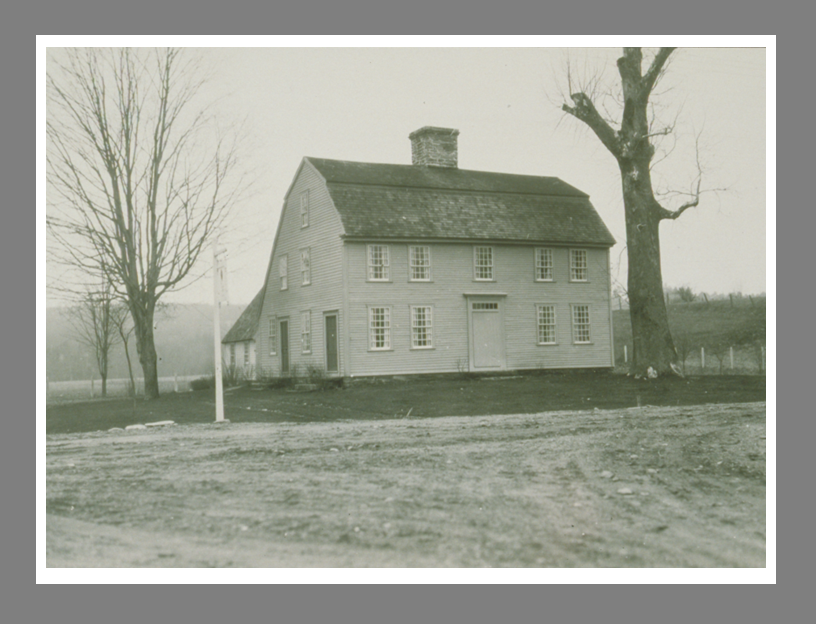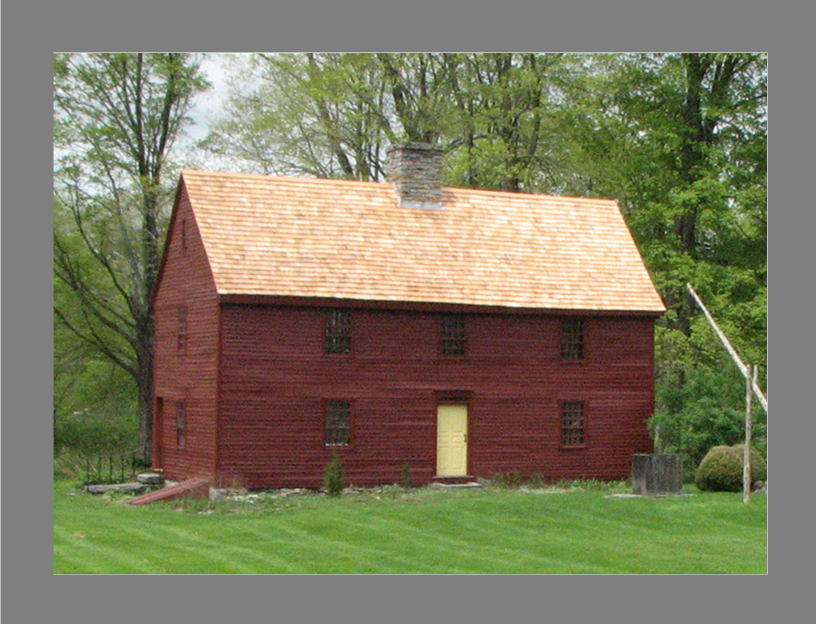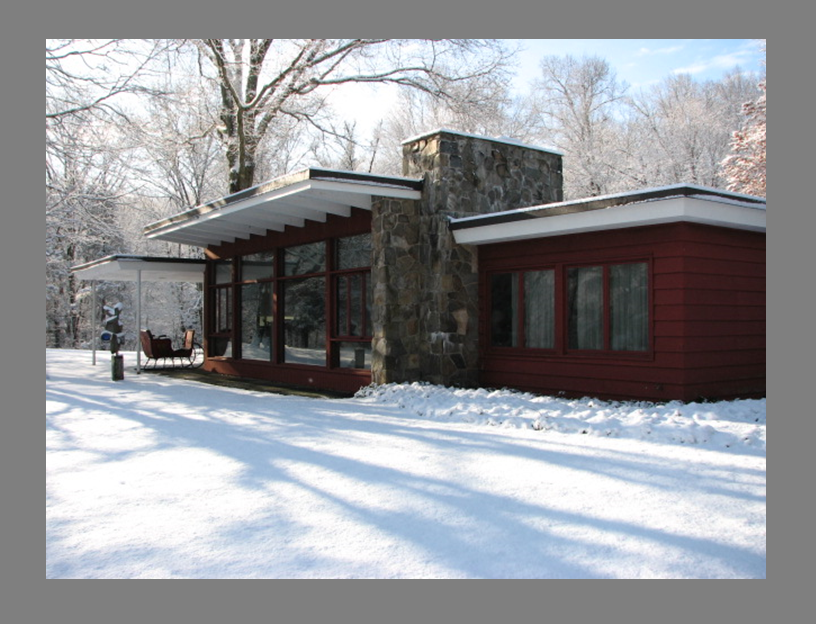Historic House Museums
Glebe House (1740) 1.79 acres (also 1.42 acres and 0.52 acre)
 The Glebe House is a Historic House Museum in Woodbury, Connecticut. It is one of the oldest historic house museums in the United States.
The Glebe House is a Historic House Museum in Woodbury, Connecticut. It is one of the oldest historic house museums in the United States.
Built in stages from 1737 to 1750, the Glebe House was the home of Sarah and John Rutgers Marshall and their nine children from 1771 to 1786. John Marshall was the first Anglican minister in Woodbury. The house was given to the Episcopal Church in 1921. Restoration work was undertaken in 1923 under the supervision of Henry Watson Kent. The Glebe House was transferred to the Seabury Society for the Preservation of the Glebe House in 1925. As 1925 marked both the year that the Seabury Society was formed and the year when the Glebe House became a historic house museum, 2025 marks the Centenary of the Glebe House.1
On March 25, 1753, ten of Connecticut's fourteen Anglican clergy met at the Glebe House in Woodbury. They elected as bishop Reverend Samuel Seabury of Ledyard, who was then a missionary at Groton and New London, Connecticut. Refused consecration by both archbishops of England, Samuel Seabury was finally concencreated by the three bishops of the Church of Scotland on November 14, 17S4 at the home of Bishop Skinner in Aberdeen, Scotland. For over two years, Samuel Seabury was the only Episcopal bishop in America. For this reason the Glebe House has been called by George T. Linsley "the birthplace of the organized Episcopal Church in the United States.2
The Glebe House was named by the National Park Service to the National Register of Historic Places on March 11, 1971 under two criteria - (1) Architecture, (2) Religion. NRHP Reference number: 71000902. Constance Luyster, Administrative Trainee at the Connecticut Historical Commission in Hartford, prepared the nomination and submitted it to the National Park Service on November 5, 1970. Unique ID #404700.
The 0.52-acre "Triangle" parcel is owned by the Seabury Society. This parcel lies on the north side of Hollow Road and is bordered by Glebe House Lane and Sycamore Avenue (CT Route 317). A 1.42-acre meadow across the entrance road to The Hollow Park was purchased from the Griswold family on June 13, 2005.
SOURCES
Kent, Henry Watson, The Glebe House, Woodbury, Connecticut, Pamphlet;Linsley, G.T., The Old Glebe House at Woodbury and its Historic Background, Pamplhlet;
Kelly, J.F., The Early Domestic Architecture of Connecticut;
Crofut, F.S.Marcy, Guide to the History and the Historic Sites of Connecticut, Yale University Press, 1937. 2
The Glebe House became a historic house museum prior to the passing of regulations governing historic house museums in Woodbury. The Glebe House lies within Woodbury Historic District No. 1. As a result the Glebe House falls under the jurisdiction of Woodbury's Historic District Commission.
Hurd House (1680) 0.72 acre
 The Hurd House is located at 25 Hollow Road, within Woodbury Historic District No. 1. It was built in 1680 and is the oldest house in Woodbury. It is the oldest building at its original site in Litchfield County. Of buildings designed as one-room over one-room, the Hurd House is the oldest example in Connecticut. This historic building was acquired by Old Woodbury Historical Society on November 28, 1967 and is occasionally open to visitors. The barn was built in 1800. Unique ID #403600.
The Hurd House is located at 25 Hollow Road, within Woodbury Historic District No. 1. It was built in 1680 and is the oldest house in Woodbury. It is the oldest building at its original site in Litchfield County. Of buildings designed as one-room over one-room, the Hurd House is the oldest example in Connecticut. This historic building was acquired by Old Woodbury Historical Society on November 28, 1967 and is occasionally open to visitors. The barn was built in 1800. Unique ID #403600.
The Hurd House became a historic house museum prior to the passing of regulations governing historic house museums in Woodbury. The Hurd House lies within Woodbury Historic District No. 1. As a result the Hurd House falls under the jurisdiction of Woodbury's Historic District Commission.
Old School House (1867) 0.24 acre
The Old School House is located at 423 Main Street South within Woodbury Historic District No. 1. The building was acquired by the Old Woodbury Historical Society on March 16, 1977. The Old School House has been classified as a Museum by the Town of Woodbury. Unique I.D. #403700.
Leroy Anderson House (1953) 13.2 acres
 The Leroy Anderson House is a Historic House Museum in Woodbury, Connecticut. Leroy Anderson commissioned the Waterbury architect Joseph Stein (1916-1977) to design the house in 1953. Joseph Stein received his B.A. in Architecture from Dartmouth College and studied under Bauhaus School co-founder Walter Gropius and Marcel Breuer at the Harvard Graduate School of Design. This was the first private residence designed by Stein who previously had only designed public buildings. 3
The Leroy Anderson House is a Historic House Museum in Woodbury, Connecticut. Leroy Anderson commissioned the Waterbury architect Joseph Stein (1916-1977) to design the house in 1953. Joseph Stein received his B.A. in Architecture from Dartmouth College and studied under Bauhaus School co-founder Walter Gropius and Marcel Breuer at the Harvard Graduate School of Design. This was the first private residence designed by Stein who previously had only designed public buildings. 3
The Leroy Anderson House was built by the McGinn Company of Naugatuck, Connecticut. McGinn had built all of Stein's public buildings. This was the company's first private residence.
Contruction on the modern house was nearly complete when the Anderson family moved in during October of 1953. Eleanor and Leroy Anderson raised their four children here.
Eleanor Anderson continued to live in the house after Leroy Anderson's death in 1975 from lung cancer. The house has been well maintained and remains unaltered. Eleanor Anderson commissioned the Architectural Historian Rachel Carley in Litchfield, Connecticut to prepare the nomination and submit it to the National Park Service on November 16, 2012. The Leroy Anderson House was named by the National Park Service to the National Register of Historic Places on December 31, 2012 under two criteria - (1) Person of prominence (Performing Arts), (2) Architecture (Mid-century modern). NRHP Reference number: 12000361. 5
The Leroy Anderson Foundation was formed in 2010 by Eleanor Anderson as a 501(c)3 tax-exempt, private operating foundation. 6 Following Mrs. Anderson's death in November 2014, the Leroy Anderson House and surrounding land was conveyed to the Leroy Anderson Foundation. The Leroy Anderson House was designated as a Historic House Museum by the Town of Woodbury on March 27, 2018. 7 8
The Leroy Anderson House welcomes visitors for guided tours during nine months of the year. The Foundation hosts concerts of classical music at the Leroy Anderson House. Outdoor concerts are scheduled from May through September. Indoor concerts are scheduled for October through April.
The house sits on a two-acre landscaped lawn with plantings of various maple, oak, hickory, beech, tulip trees, shrubs and flowers. The parcel that is directly associated with the Leroy Anderson House measures 13.2 acres. An additional 21.8 acres of undeveloped woodland and meadows on both sides of Grassy Hill Road are owned by the Leroy Anderson Foundation and are managed as natural areas. The Leroy Anderson House does not lie within a Historic District. As a result, there are no protections in place to insure the preservation of this historic house.
The Leroy Anderson House is one of a small number of composers' homes in the United States occasionally open to the public. Unique ID #6300.
References
- 1. The Glebe House Museum, History, webpage: [www.glebehousemuseum.org_about_us]
- 2. National Archives and Records Administration: "Glebe House, Woodbury, Connecticut" [https://catalog.archives.gov/id/132354821]
- 3. Leroy Anderson Foundation, Leroy Anderson House, Joseph Stein, Architect
- 4. Leroy Anderson Foundation, Leroy Anderson House, webpage: [www.leroyandersonfoundation.org/leroy-anderson-house.php]
- 5.IRS Letter of Acceptance of Leroy Anderson Foundation as 501(c)3 Tax Exempt organization.
- 6.National Archives Administration: "Leroy Anderson House, Woodbury, Connecticut" [https://catalog.archives.gov/id/132354744]
- 7.Town of Woodbury, Historic House Museum, Minutes: March 27, 2018.pdf
- 8.Town of Woodbury, Historic House Museum, Minutes: September 24, 2019.pdf
Footnotes
1. The Glebe House is closed during the Winter months.2. The Leroy Anderson House is open all through the Winter. Outdoor concerts take place in May, June, and September. Indoor concerts take place in October, through April. Admission is free including concerts. Non-profit organizations whose missions include the performing and visual arts, land conservation or historic preservation may inquire about holding a meeting at the Leroy Anderson House,